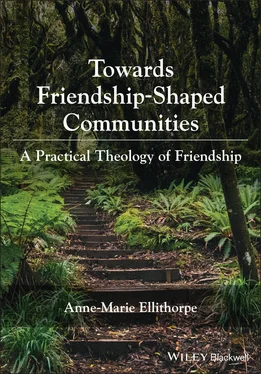1 ...6 7 8 10 11 12 ...23
Part II: A Deep Remembering
The normative task, based on Browning’s historical theology sub-movement, involves confronting the scene set in the previous section with the central normative texts of Christianity. The goal is to consider the implications of honest confrontation with normative texts of the faith, including whether theology has understood its ideals appropriately. 74 The tasks of interpretation and retrieval of normative texts is not only integral to, but also at the very heart of the hermeneutical process. 75 This normative work is not a distanced study of ideas of the past. The past is not disconnected from present events. 76 Rather it is the past from which the present emerges and takes its shape.
A note of caution: if interpretive work focuses primarily on understanding contemporary praxis rather than on understanding texts within their historical contexts, then the work fails to respect history as a separate dialogue partner. Biblical and historical texts stripped of their initial context and meanings are “partially silenced.” 77 There is a danger of focusing on the way texts are used and understood within current contexts, rather than on the context within which they originated. Consideration of both contexts is important: context matters in relation to both current practice and the interpretation of historical documents. I acknowledge, however, that it is impossible to do justice to all contributing disciplines within this wide-ranging research. It is not possible to provide equally thorough descriptions of current practice and historical-contextual analysis of normative texts.
These chapters consider what a variety of normative texts have to say about friendship and seek to identify the understandings and practices of friendship that these texts encourage. I seek to assist communities to draw upon the richness of ancient texts and traditions, in their responses to contemporary relational needs. Christian practical theology gives special weight to classic Christian texts, while also considering classic texts within inter-related traditions, including the Greek classics “that influenced the Israel of Jesus’ day,” as well as the writings of the Second Testament. 78
Listening to texts to which Christianity has itself listened includes attentiveness to the Hebrew scriptures. These scriptures are the focus of Chapter 3. I focus particularly on the possibility of friendship being inherent within the creation accounts, and the role of friendship within the prophetic tradition, within covenantal relationships, and within the wisdom tradition. Chapter 4turns to Matthean, Lukan, Johannine, and Pauline depictions of friendship and community. 79
The philosophers of antiquity influenced early Christian writings and practices and continue to inform conversations regarding friendship. Within Chapter 5I intertwine the insights of the classical philosophers, particularly Aristotle and Cicero, with themes emerging from the lives and writings of four conversation partners within subsequent Christian traditions, focusing on the essentialness of friendship, characteristics and practices of friendship, the question of friendship with the divine, and the relevance of friendship to communities.
A transitional bridging chapter notes pivotal shifts in vision in the Western world that took place in the late medieval and early modern period, their negative impact on personal and civic expressions of friendship in and beyond that world, and the potential for a cosmic vision of friendship to reveal the broader reality in which we are immersed.
Part III: Friendship, Theology, and the Social Imagination
The third phase of this research explores the relevance of the normative work (Part II) to the descriptive work (Part I) and further develops core normative ideals. This is not a simple application of the past to the present, but rather involves the examination of large encompassing themes and trends. The systematic stage includes gaining a comprehensive understanding of ideals that have emerged from the normative task, ideals that are typically conveyed in narratives and metaphors. 80 Consideration is given to revisions in practice and understanding that may be provoked through the fusion of horizons.
While we may never entirely understand our own situation, that part of our situation of which we do have awareness may be described as a horizon. Systematic theology, according to Browning, is the fusion of horizons between the vision of reality implicit within contemporary practices and the vision of reality inherent within normative Christian texts. 81 Browning’s contrast between two visions is helpful yet oversimplified. The horizon of the past has already impacted the present and thus impacted us. Texts of the past are already assimilated in various ways into contemporary understandings and practices; they have already had some impact on us as interpreters. We cannot understand the horizon of the past on its own terms, because we cannot leave ourselves behind. 82
Further, the fusion of horizons is an ongoing process. Our horizons are never static, but rather move due to changing conditions and provoke new questions to be asked. 83 Nor are present or historical horizons ever isolated. Old and new are continually “combining into something of living value” 84 in an ongoing process of fusion. Our present horizon is where understanding begins. In the to and fro of dialogical interactions between texts throughout this research, the fusion of horizons does not imply the giving up of one horizon for the sake of another. 85 Rather, horizons are brought together in a dialogical relationship through a dialectical process of give and take, question and answer, and seeking to understand the perspectives of others. 86 Within this research, the fusion of horizons through mutually critical dialogue takes place between theological sub-disciplines (including biblical, historical, and spiritual theology), as well as with non-theological disciplines.
Chapter 6explores themes of relationality, mutuality, and friendship in relation to doctrines of God and creation, and draws on functional and relational understandings of the imago Dei motif. Chapter 7explores themes of mutuality, open friendship, and the human vocation in relation to pneumatology, Christology, and ecclesiology, highlighting ways in which theology may contribute to fostering an imagination that promotes friendship in its various forms. The relationship between friendship and love, and the formative potential of friendship, are explored within Chapter 8. Friendship is affirmed as a school of love, and thus also of hospitality, freedom, and wisdom. Spirit-shaped friendships and friendship-shaped communities have the potential to reflect the character of God, and to shape us in the way of God.
Part IV: Practicing Friendship
The fourth and culminating sub-movement seeks to develop more fully informed practice. Integral to the practical theological enterprise is a “preferential option for practice.” 87 This move towards transformed action is described by Browning as strategic or fully practical theology, in which the theologian returns to the original issue with ideals that have become better understood in order to determine what additional light can be thrown on the issue and what deeper interpretations are now possible. The crucial test of clarified ideals and norms is their capacity to heal and nurture persons and groups within specific contexts. 88 The following questions are recommended for this movement: How do we understand the specific context in which we must act? What is ideal praxis within this context? 89 How do we “critically defend” the norms of such praxis? 90 What strategies should we use in this context?
Читать дальше












